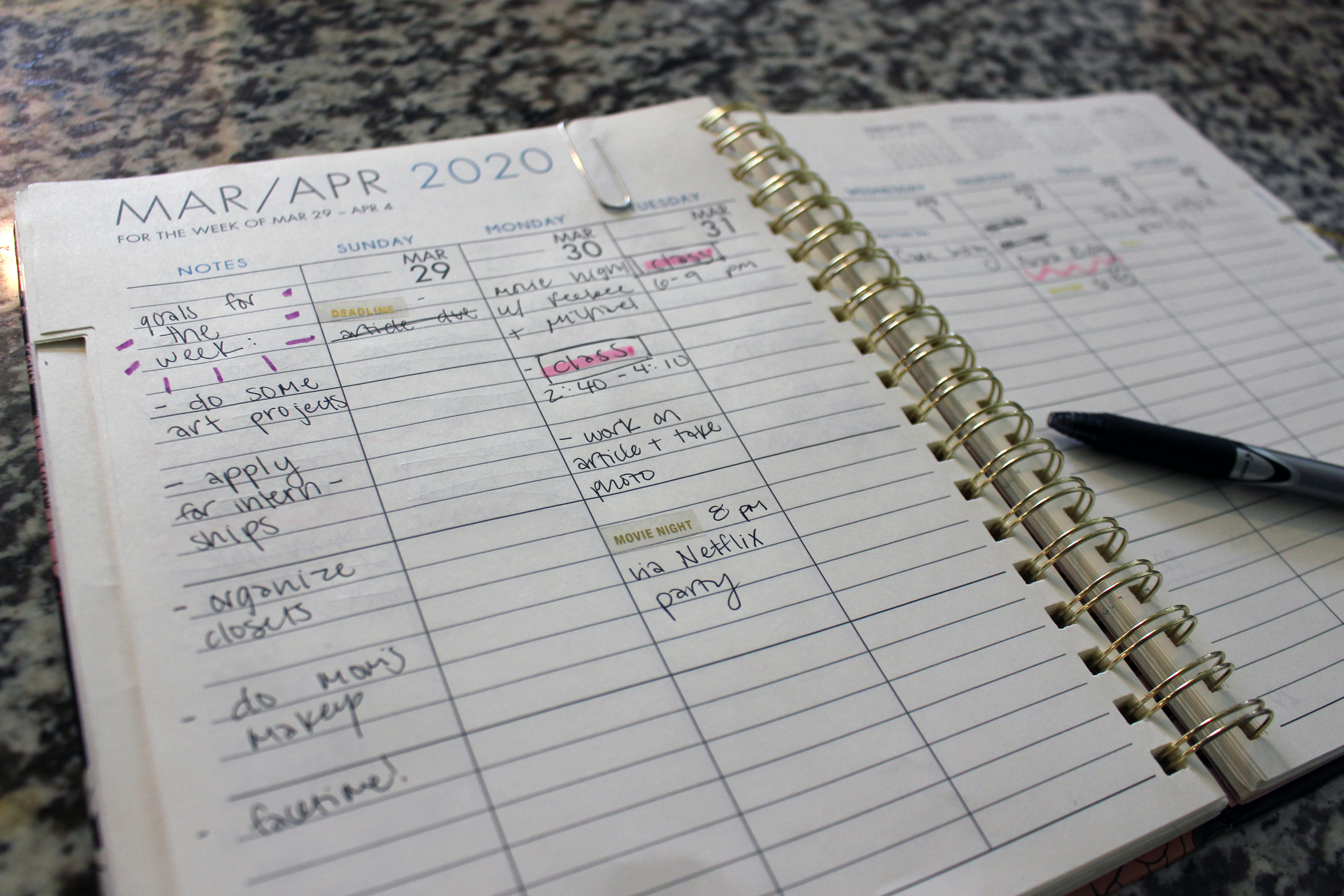Lying underneath three blankets in my dark room and still wearing last night’s pajamas, I scrolled through endless articles and updates of how the world is being affected by COVID-19. Seemingly overnight, everyone I knew had their lives upended because of this global pandemic, but I never imagined that I would live through a global crisis that forced me to stay home and just — do nothing. Some of my friends were suddenly struggling to adapt to this new lifestyle, while others were just trying to manage amidst the chaos around them. Tyrel Alejandro, a student at Columbia College, shares the sentiment that many now-online students and workers seem to be feeling.
“I don’t think any other event has shaken the world up like this in our lifetimes,” Alejandro said. “One second I was going to school and now I’m about to start taking online classes … being alone with nowhere to go, it gets old kind of quick.”
Plenty of articles will tell you how to properly wash your hands and seal off your home against germs, but there is not as much that pops up if you Google “how to keep your sanity during a global pandemic.” Everyone responds differently during a crisis. While some may quickly look to tasks and activities to fill their time at home, others may focus on adjusting to their new normal after their lives have been upended. That being said, there are plenty of things we can do to promote our health — and our humanness — during this time.
Go Outside
While quarantine does mean we should get comfy holing up at home for a while, that does not mean it’s illegal for us to pop outside for a breath of fresh air every now and then. The New York Times recently published an article written by retired NASA astronaut Scott Kelly, who spent nearly a year on the International Space Station. One of the primary things that Kelly recommended for surviving isolation was seeking outdoor time.
“One of the things I missed most while living in space was being able to go outside and experience nature. After being confined to a small space for months, I actually started to crave nature…It brought me back to earth,” Kelly said in the article. “Research has shown that spending time in nature is beneficial for our mental and physical health, as is exercise. You don’t need to work out two and a half hours a day, as astronauts on the space station do, but getting moving once a day should be part of your quarantine schedule (just stay at least six feet away from others).” If you do choose to brave the outdoors, just ensure that you follow Centers for Disease Control and Prevention (CDC) guidelines and keep at least 6 feet from others while avoiding possibly busy areas.
Get Active
Going outside is important, but moving around is just as essential. According to DePaul psychology professor Joanna Buscemi, remaining active can benefit your mental health.
“Being stuck inside can increase depressive symptoms in some — especially among those who are already at higher risk for depression,” Buscemi said. “Staying physically active can help to reduce stress and depression, and is something that we can all do during this difficult time.” Chicago-based studios Shred415, Studio Fuse, Studio 3 and FFC are currently offering free streamed classes that can be followed from home.
Plan Your Day
It can be easy to float through days as if time has no bounds and the days have no beginning or end, and it can become difficult to maintain a sense of normalcy in the current situation. What can make this time difficult is not so much that we have to stay home, but that we do not have our regular schedules, outings, and events to look forward to that would shape our days, weeks, and lives normally. To combat this, it’s important that we maintain some sort of routine to keep our minds busy and active. Get a planner and write a list of things you want to do each day, or write a to-do list of things you want to accomplish. Practice going to bed and waking up around the same time, and try planning your day around meals if you have nothing else to fill the time with. Maybe you take a daily walk in the afternoon, or make your bed first thing every morning when you wake up.

Cate Hoogstraten, 14 East
“There is that lack of control that we experience with these circumstances…which cause us to feel that we are losing a little bit of our agency,” said Verena Graupmann, Associate Chair of Psychology at DePaul University. “Routines are a good way to fight that, because at least you have control over [a routine].”
Tune Into News, Then Tune Out
Although it can be tempting to glance at your phone every ten minutes trying to catch the next novel coronavirus update, experts warn this may not be the healthiest habit to develop.
“Read the news in the morning, and then do not let yourself look again until the next day,” Grapmann suggests.
“Don’t watch, listen to, or tune into news on the coronavirus all day, every day,” Buscemi said. “We are being inundated with news and it is overwhelming, so you need to take breaks.”
Catch up on news in the morning, and if you can, turn off notifications for the rest of the day, or take planned breaks from technology and media.
Dig up Forgotten Projects
Remember when you told yourself months ago that you would clean out your closet and sort through that box of random papers you have under your bed? Now is the chance to do that! Having time alone means you finally have time to sit down uninterrupted and hammer out all the projects you have been putting off for a “rainy day” in the near future. Clean your room, get rid of the things in your space that do not make you happy, or organize your spice rack!
Fall *Back* in Love with Pinterest
Whether you love Pinterest right now or not, it may soon become your new favorite app. If you’ve run out of projects to keep yourself busy, there are plenty of ideas floating around this app on how to DIY your entire life. You’ll come across so many recipes, crafts, and projects that you probably never thought of doing before, but at least it’s something new to try! The app also has a pop-up when you first open it that takes you directly to a page that has health tips and projects to help you get through the COVID-19 pandemic.
Schedule “Face” Time
While it is easy to allow friendships to fall to the wayside when we’re not seeing them in person all the time, it’s important for our health – and theirs – to stay in touch in whatever ways we can.
“Stay connected with friends and family,” said Susan D. McMahon, Vincent de Paul Professor of Psychology. “Skype, Facetime, Zoom – we all need support, and many forms of support can fit within the guidelines of keeping physical separation.” With a quick international turn to self isolation, the ways in which we can connect online now are numerous.
“Reach out to people who you do not talk to that much — after all, everyone is home and not really busy,” Graupmann said.
Perhaps quarantine is the perfect time to rekindle old friendships or relationships you still hold close to heart.
And Remember:
“During this time, think about what you can do to help others,” Graupmann said.
Thinking about what you can do takes the focus off the situation you are in, and can help you control what is going on around you in the most productive, beneficial, and kind way possible.
“Have confidence that we will get through this,” McMahon said. “Things will get better, so hang in there. Reach out for help if you need it – there are a lot of teletherapy options available.”
For a list of Chicago-based mental health resources, see the list below:
It is a completely normal reaction to feel emotional about the circumstances during this time. If you or someone you know is looking for emotional or mental health support, Chicago.gov offers several local ways in which you can find remote aid.
- Connect to a NAMI Chicago Helpline mental health counselor by calling 311 or directly at 833-626-4244
- Connect to Bright Star Community Outreach‘s trauma counseling helpline at 833-TURN-123
- Connect to free teletherapy services at Chicago Department of Public Health Mental Health Centers by calling 312-747-1020.
- For after hours support, contact Crisis Text Line which serves anyone, in any type of crisis, 24 hours a day. Instructions: Text HELLO to: 741741 to access a trained crisis counselor.
- Tips on Managing Anxiety about COVID-19
- Mental Health and Coping During COVID-19
- Guidance for Parents in Talking to Children about COVID-19
Header Illustration by Jenni Holtz, 14 East




NO COMMENT